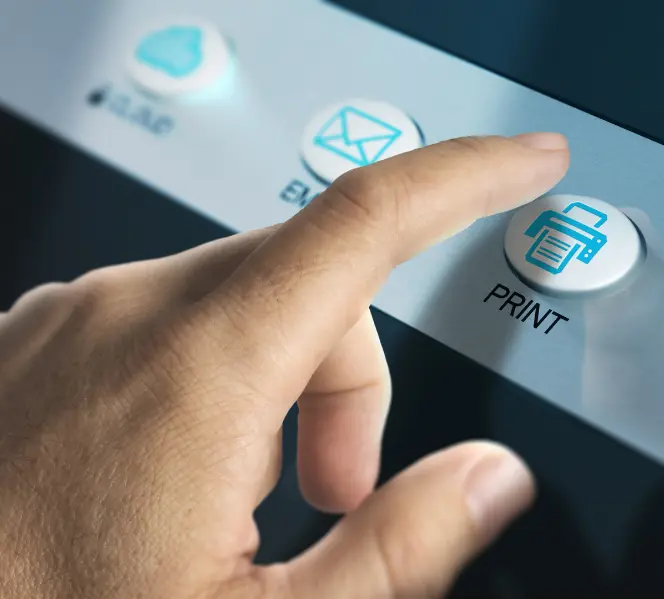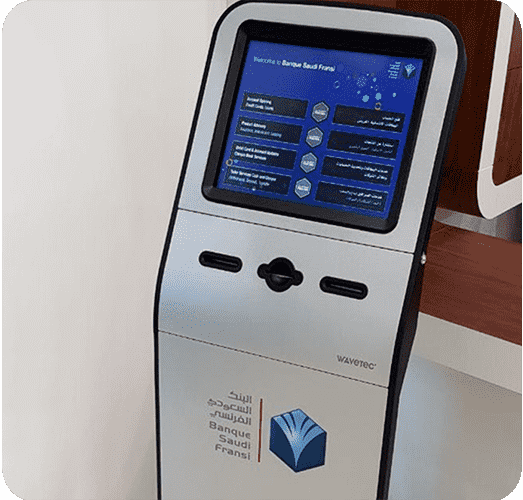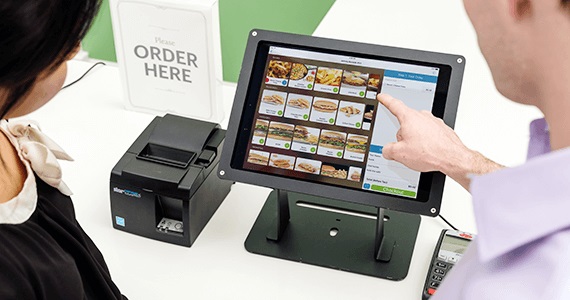In this blog: learn all that you need to know about kiosks; from answering, “What is a kiosk machine?” to the future of digital kiosks, this blog covers it all.
What is a Kiosk?
A kiosk is an innovative and versatile solution for businesses and organizations looking to engage with customers in new and exciting ways. It is a stand-alone booth that can be built and utilized for various purposes in high-traffic areas such as malls, airports, and train stations.
Variants of Kiosks
There are various variants of kiosks and you can choose amongst them depending on your needs. The five most common variants of kiosks are as follows:
- Sim Dispensing Kiosks
- Cash & Check Deposit Kiosks
- Card Issuance Kiosks
- Quick Service Restaurant Kiosks
- Self Checkout Kiosks
From delivering highly relevant information to communicating marketing messages and empowering customers to help themselves, these kiosks can serve multiple purposes. To learn more about the variants of kiosks, read Wavetec’s related blog on “5 Common Types of Self Service Kiosks in 2023”
Features of Digital Kiosks
Digital kiosks offer a range of useful features including the following:
1. Touch Screen Feature
Customers can interact with digital kiosks using touch screens. This feature enables customers and service providers to engage, enabling customers to receive the services or information they want.
2. Payment Process Feature
Customers often need to make payments to purchase goods and services through self-service. Henceforth, digital kiosks have a payment process feature that enables customers to pay via the kiosk.
3. Intuitive User Interface
Users navigate through the software to complete tasks: an intuitive user interface ensures that customers find what they want easily.
4. Printer Feature
The customers may need to print out a ticket or a receipt from the kiosk. That’s when the printer feature comes in handy; it enables the customers to generate a hard copy of their ticket or receipt.
5. Customizable
Kiosks are fully customizable; whether it’s the kiosk display, size, or outward appearance, they can be modified to cater to businesses’ specific needs as determined by the designated location and branding needs.
Additionally, the kiosks’ software is also customizable; it can be tailored to serve various purposes and cater to different business needs.
Benefits of Kiosks
Kiosks are crucial in today’s fast-paced world and they play a significant role across various industries due to the range of benefits they offer. Here is a comprehensive overview of these benefits:
1. Improved Customer Experience
Kiosks provide customers with a self-service option that can reduce wait times, provide convenience, and enable faster transactions, offering a seamless customer experience to visitors.
These kiosks minimize human interaction which enhances the experiences for people who avoid human interaction. Most importantly, they can also improve accessibility for customers with disabilities.
2. Increased Customer Engagement
Interactive kiosks offer engaging experiences that encourage users to actively participate and interact with the kiosk’s interface. Offering such interactive experiences help businesses and organizations improve customer satisfaction and thus, boost sales.
3. Enhanced Marketing
Promotional kiosks display products, provide information, and offer special promotions, which can help increase the brand’s reach and increase sales.
4. Manage Customer Flow
Kiosks are often located in high-traffic areas. This is because kiosks are a powerful tool for managing customer flow. With their self-service options, queuing management, real-time updates, appointment scheduling, and feedback collection, kiosks can help reduce wait times, improve efficiency, and enhance customer experience.
5. Improved Data Collection
Digital kiosks can collect valuable data on user behavior, preferences, and needs. This data can be utilized to draw insights and thus, improve the overall performance and efficiency of the service providers.
6. Save Cost
While deploying a kiosk may be expensive, the smart solution helps businesses save costs in the long term. By reducing labor costs, increasing efficiency, and improving accuracy, kiosks can help businesses save money.
Importance of Kiosks in 2023
In today’s fast-paced world, kiosks have become an increasingly important technology for businesses and organizations looking to keep up with changing customer needs and preferences. Kiosks offer a quick and convenient way for customers to access information, complete transactions, and obtain services, all while reducing wait times and improving efficiency.
As we move further into 2023, kiosks will continue to play a crucial role in enhancing customer experience and enabling businesses to stay competitive in a rapidly changing market.
Top Industries Harnessing the Power of Digital Kiosks
Kiosks are an essential tool for customer-facing industries seeking to improve operational and administrative efficiency. Here is how some of these industries are utilizing digital kiosks:
1. Retail
Retail businesses have been quick to adopt kiosks to enhance the customer experience and streamline operations. Retail businesses are using kiosks for a range of purposes, from providing product information and recommendations, to offering self-checkout options and personalized promotions.
By leveraging the power of digital kiosks, retailers can create a more engaging and efficient shopping experience for customers, while also driving sales and improving customer loyalty.
Take the example of Consum, a Wavetec client that recently purchased take-a-ticket kiosks to improve their customer service. These kiosks allow customers to take a number and wait for their turn without having to physically stand in line, freeing them up to browse the store or complete other tasks.
2. Banking
The banking industry has also embraced the use of digital kiosks as a way to enhance customer experience and optimize service delivery. This technology is particularly useful during peak periods when banks are crowded and customer wait times can be long.
By leveraging the power of digital banking kiosks, banks can offer a more personalized and efficient service, improve customer satisfaction, and thus, increase sales.
Banorte recently purchased kiosks as part of Wavetec’s customer flow management solution. These kiosks allow customers to check in and be placed in a virtual queue, eliminating the need to wait in long lines.
3. Airline
Digital kiosks have become an increasingly popular solution in the airline sector. Kiosks allow customers to check in, print their boarding passes, and tag their bags, all from a single convenient location at airports. This not only speeds up the check-in process but also eliminates the need for customers to interact with airline staff, reducing waiting times and improving efficiency.
From providing self-service check-in and bag drop options to offering personalized recommendations and promotions, touch screen kiosks can help airlines and airports create a more efficient and interactive experience for travelers.
Wavetec’s queuing solution for Delta Airlines entailed ticket dispensing self-service kiosks that enabled customers to generate tickets and wait for their turns. This enabled Delta Airlines to streamline customer flow and minimize waiting time.
4. Public
The public sector has also recognized the value of digital kiosks in enhancing service delivery and improving customer experience. Kiosks at public service centers enable customers to schedule appointments, receive tickets, and track their place in the queue and wait times, all from a self-service kiosk.
This simplifies the process for customers and reduces the staff’s workload, allowing them to focus on other tasks. This technology has been particularly useful during the pandemic, as it allows for contactless service delivery and reduces the need for customers to physically interact with staff.
Various public service centers are now using digital kiosks to improve service delivery, optimize operations, and enhance the customer experience. Look at the example of the Ministry of Justice in the Kingdom of Saudi Arabia. They have partnered with Wavetec and deployed ticket-dispensing self-service kiosks as part of their queuing solution. It has enabled visitors to generate their own tickets and thus, make queue management much easier.
By leveraging the power of digital kiosks, the public sector can create a more efficient, convenient, and engaging service experience for customers, while saving the overhead costs required to maintain high-quality standards of services.
5. Healthcare
Digital kiosks are becoming increasingly popular in the healthcare sector as a way to improve patient experience and streamline processes. Hospitals and clinics can use kiosks to provide patients with self-service check-in and appointment scheduling, access to medical records, and payment options.
This not only reduces wait times and frees up staff, but also improves patient satisfaction. Kiosks can also be used for education and communication purposes, providing patients with information on common medical conditions, treatment options, and healthy living.
Additionally, pharmacies can use kiosks for prescription dispensing and refills, allowing patients to easily and efficiently receive their medication. Overall, the use of digital kiosks in healthcare has the potential to improve efficiency, patient satisfaction, and communication in the industry.
Nyaho Medical Company, a leading healthcare provider in Ghana, has implemented Wavetec’s Patients Flow Management System. As a part of this solution, the company has installed ticket dispensing self service kiosks to enable patients to check in quickly and easily obtain queue numbers upon arrival. This has not only reduced waiting times but also improved patient satisfaction by providing a more seamless and efficient experience.
Considerations for Selecting a Digital Kiosk
There are several types of kiosks available, each consisting of unique features and serving a distinct function. Here are factors that you must consider while choosing a digital kiosk:
1. Goals
The purpose and the ultimate goal of the kiosk play a key role in determining the type of kiosk you need. For example, if the goal is to make navigation easier for visitors, then you need to deploy wayfinding kiosks. However, if the goal is to minimize human interaction while enabling customers to purchase, then vending machines may be the right choice.
2. Location
It is crucial to consider the location of the kiosks before selecting a kiosk; develop an understanding of the space and the issues faced by the people in that location. For example, if you are looking for kiosks at the entrance of the service center, you can either deploy ticket dispensers or wayfinding kiosks, depending upon what the pain point of the visitors in that location is.
3. Security
Kiosks can store sensitive data, including customer information and financial transactions, making them a potential target for hackers and other cybercriminals. This makes customers’ security a primary concern. Therefore, it is crucial for businesses to select solution providers that focus on high-security standards. Wavetec kiosks, for instance, are equipped with advanced security features such as encrypted data transmission, password-protected access, and remote monitoring capabilities.
4. Maintenance and Support
Like any other hardware and software solution, digital kiosks are also highly technical and complex. This makes it essential for the solution provider to also offer good after-sales maintenance and support services, enabling businesses to maximize the potential utility of the digital kiosks.
5. Integration with Existing Systems
Kiosks such as ticket dispensers or cash deposit machine need to be integrated with other existing systems to ensure that the data is well-managed and organized. A kiosk that integrates seamlessly with your existing systems and software can save you time, effort, and money. If the kiosk is not integrated with the rest of the system, it will essentially be useless – it will fail to streamline processes and organize long queues. Therefore, businesses must consider how well-integrated the kiosk is. Ideally, the kiosk must also be integrated with a dashboard that gathers and reports real-time data.
Future of Digital Kiosks
The future of digital kiosks is expected to be even more innovative and advanced. With the ongoing advancements in technology, digital kiosks are likely to become more interactive and intuitive, with features such as voice recognition, artificial intelligence, and augmented reality. The integration of these technologies will allow for a more personalized and efficient user experience.
Additionally, the use of biometric authentication is likely to become more widespread, ensuring a higher level of security and convenience for users. The integration of mobile devices with kiosks is also expected to increase, allowing users to interact with kiosks through their smartphones.
The use of data analytics and real-time reporting will become more prevalent, allowing businesses to make more informed decisions based on user behavior and preferences. Overall, the future of digital kiosks looks very promising and will continue to play a significant role in improving customer experiences across a wide range of industries.
Key Takeaway
Digital kiosks are rapidly becoming an essential tool for businesses across various industries to enhance customer experiences, increase efficiency, and drive revenue growth. With the advancements in technology, digital kiosks are becoming more intelligent, interactive, and user-friendly, providing businesses with a competitive edge in today’s fast-paced world.
If you’re looking to implement digital kiosks into your business, book a free demo with Wavetec now!
BOOK A FREE DEMO












